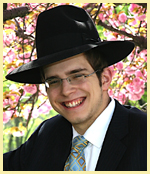|
When Rivka passed places of idol worship, she felt the fetuses inside of her pushing to get out. Rivka was very perturbed, and exclaimed, ‘if so, why is this I’ [or ‘why is this my I’]. What does this mean?
I would like to suggest the following interpretation: Rivka had defined herself as a woman trying to bring children into the world to serve Hashem. That was her zich, her ‘I,’ and hence, she was very distraught and exclaimed, ‘what is the point of my ‘self’ if this child is going to be wicked?’
When we set out to achieve a goal, all too often we want that goal to define us. Whether it is in the business world of wanting to be a successful doctor and the like, or in the spiritual realm of wanting to be a certain personality and figure, or trying to overcome a bad midah, we want that to be our crown jewel and accomplishment.
The problem with this is… if we aren’t successful. We then feel very depressed and unmotivated.
A key to living a meaningful and successful life is not to put all the eggs in one basket. We shouldn’t have one specific area that defines us. We should try to shine in many different areas. That way, even if we aren’t successful in one of them, we can find meaning and happiness in others.
This, I suggest, is what was going on with Rivka. She defined a large part of her ‘self’ by having good children and was very saddened when she passed the idol worship house. The rest of the pasuk was her way of coping with it. It states she went ‘Lidrosh Es Hashem.’ Doreish means to seek out, so perhaps the pasuk means she went to find other ways to seek out, connect to, and emulate Hashem, so that those accomplishments would give her meaning even if her child wouldn’t!
May we all take this lesson to heart, to have many talents, goals, and aspirations to help define ourselves. This way, when some don’t materialize, we will find solace and meaning in the rest of our achievements. |





